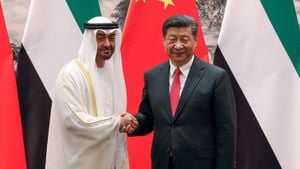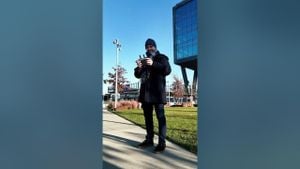President-elect Donald Trump, speaking from his Mar-a-Lago estate, held his first post-election news conference where he jumped from one hot-button issue to another, recalling his trademark freewheeling style. From vaccine-autism controversies to major investment announcements, Trump displayed both the confidence and controversies characteristic of his political persona.
One of the most eye-catching announcements was the pledge of $100 billion investment from Japanese technology giant SoftBank, presented alongside SoftBank CEO Masayoshi Son. Trump asserted, "He feels very optimistic about our country since the election,” indicating strong backing from corporate leaders. This bold pledge echoes SoftBank’s previous commitments, which have yielded mixed outcomes, including the infamous collapse of WeWork.
The emphasis of the briefing spanned multiple topics. Trump revisited the contentious issue of vaccines and autism, claiming again there is something wrong and insisting, "We're going to find out about it,” as he appointed Robert F. Kennedy Jr., known for rejecting mainstream vaccine science, as his secretary of Health and Human Services.
Speaking about immigration, Trump expressed outrage over President Joe Biden's decision to sell unused border wall materials, labeling it “almost a criminal act.” He claimed, "Congress required its disposal,” pushing back against federal actions he viewed as missteps.
While addressing his cabinet nominees, Trump praised Pete Hegseth for secretary of defense and reaffirmed his faith in Kennedy. “I think he’s going to be much less radical than you would think,” Trump mentioned, hoping to mitigate concerns surrounding Kennedy's past controversial positions. The incoming president also hinted at potential changes within the CIA as he reassessed other appointments, showcasing his commitment to reshaping the federal infrastructure.
Trump's narrative returned to national security concerns, particularly about recent drone sightings. He claimed, "The government knows what is happening,” claiming military officials had information about their origins. This statement taps back to his characteristic assertiveness, often maintaining control over discussions related to defense and intelligence.
Interestingly, he indicated he might pardon New York Mayor Eric Adams, who faces legal challenges following accusations of corruption. Trump noted, “I think he was treated pretty unfairly,” linking Adams’s troubles to his divergence from party lines on immigration, speculating this led to the indictment.
The former president also promised to initiate lawsuits against media organizations he believes misquote him, demonstrating his long-standing animosity toward the press. He described the media as "very corrupt,” emphasizing the legal actions he plans to pursue against specific outlets like the Des Moines Register due to supposedly fraudulent polling they published pre-election.
Trump’s attitude reflected not only on his self-image but also on the political climate he perceives to be shifting under his influence. He remarked on the distinct changes he felt during his second term announcement, stating, “The first term, everybody was fighting me. This time, everybody wants to be my friend.” This highlights Trump's maneuvering to consolidate power and manage relationships within his party moving forward.
On international matters, he took jabs at U.S. foreign policy, particularly concerning Ukraine, remarking on the complexity of recent military actions. He contended Russia would not have invaded Ukraine if he had been president and suggested Ukrainian President Volodymyr Zelensky should be prepared to negotiate with Vladimir Putin, without specifying what concessions might be made.
Back on domestic issues, Trump urged federal employees to return to the office post-pandemic, threatening, "If people don’t come back to work... they’re going to be dismissed.” He derided remote work arrangements as gifts to unions, displaying his hardline approach to management even before officially taking office.
Reflecting on various aspects of his economic vision, Trump boasted about plans to cut federal spending and hinted at future policies involving significant budget reductions. He claimed, “It’ll have no impact on people,” directly challenging the narratives surrounding potential budgetary impacts on social welfare programs.
The day concluded with Trump reiteratively portraying his administration’s decisive stance toward building the border wall, joking about not spending weekends at his New Jersey golf club due to the nearby drone sightings.
Trump's post-election announcements serve as traditional groundwork for his yet-to-launch second term, blending familiar themes of economic investment, national security, media suspicion, and strategic appointments. His comments foreshadow some of the potential controversies he is set to navigate as he aims to reassert control over both the Republican Party and national discourse.



